Female Industrial and Systems Engineering Graduates Poised to Make a Difference
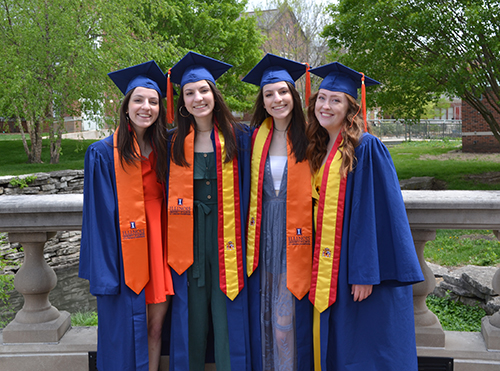
May '19 Industrial and System Engineering grads, Frances Ponicki, Teresa Ponicki, Mary Ponicki, and Siobhan Fox, ready for graduation.
May 17, 2019
Ready. Set. Go! It’s May, and a new batch of Illinois engineers, including Siobhan Fox and Frances, Teresa, and Mary Ponicki, with whom I-STEM has had significant interactions during their tenure at Illinois, are chomping at the bit to go out and change the world. The top of their respective high school classes, upon arriving on campus as freshmen, they discovered that it was a whole new ball game. They all experienced failure in one form or another, or encountered challenges that they had to work to overcome. But through the community here at Illinois, including some amazing Engineering professors, they overcame those challenges and have emerged prepared for the future—well-trained, inspired, and excited to use their knowledge and skills to problem solve and to make the world a better place.
Surprisingly, most of these women acknowledged experiencing failure as a key facet of their education. For instance, one challenge Siobhan Fox, a May ‘19 Industrial and Systems Engineering (ISE) graduate, tackled head on and learned from through a number of dismal failures was…cooking! She acknowledges that she and her fellow college students were “really not good at being adults or learning how to live just a normal adult life!” So, senior year they decided to learn how to cook in order to prepare for the real world by learning some things that they hadn’t necessarily covered in class. So about once a month, they would meet up and experiment with making food from scratch—pasta, churros and chocolate, you name it. “We failed many times,” she admits, “but we learned a lot and had a ton of fun along the way.”
However, burnt churros and clumpy pasta wasn’t necessarily the most challenging thing Fox encountered. “One of the first hurdles that I had to overcome while at U of I was actually failing an exam my freshman year,” she admits. The course? Physics 212: Electricity and Magnetism.
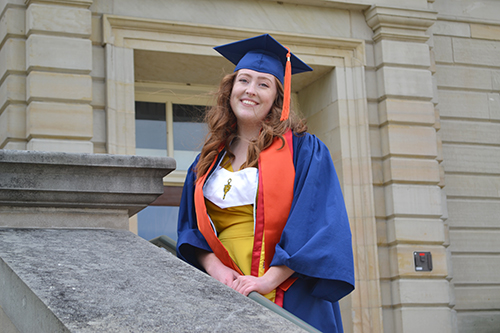
Siobhan Fox, on the Engineering Portico.
“So coming from high school I had never really failed anything before,” she continues. “And so it was a very bizarre feeling to take a class that I thought I was succeeding in, had really studied the content, felt prepared for the exam, and then just completely bomb it.”
When she got her grade back, she recalls, “It wasn't like, oh, it was a low grade and everybody had a low grade. No, my grade was in the lowest 10% of the class. I was just completely a wreck, crying in my bed.”
So she called a friend who was a year older in civil engineering and wailed: “Carly, I just failed an exam. I don't know what to do!” Did her friend say, “Ok, let’s hunker down and study!”? Nope. Fox recalls, “She's like, ‘All right, that's it. We're going to Zumba!’ But I was like, ‘I’m failing an exam! I need to study!’ She's like, ‘No, you're not studying right now. We're going to Zumba!’ she recalls, “and we just let all of the negative energy out.”
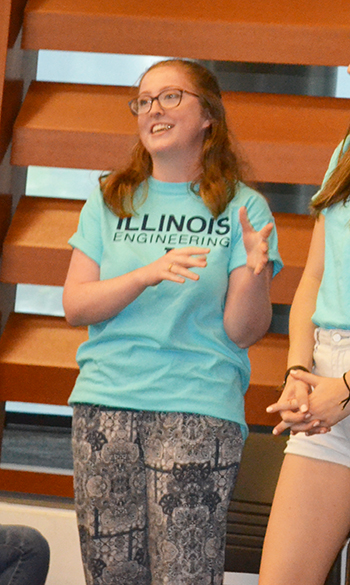
Siobhan Fox shares with incoming freshman Engineering women at the WIE orientation in fall 2018.
Afterwards, Carly did sit down with her, and they drafted a study plan for the rest of the semester, including going to office hours, relying on friends when she needed help, and studing with other people. She actually ended up getting an A- in the class! (which might have been an A+ had she not bombed the first exam!)
The above anecdote indicates how important other people were during her time at Illinois. In fact, Fox acknowledges that teamwork was one way Illinois has prepared her for what lies ahead. “The University of Illinois was really great at teaching me how to collaborate with other people and work on a team. I think that a lot of our curriculum is dedicated to making students try to learn from one another and not necessarily compete against one another. And I think that that will help me succeed on a team out in the workforce.”
Since collaboration and teamwork seemed to be the theme of Fox’s time at Illinois, another significant group of folks was the Alpha Pi Mu honor society, which had previously existed but had died out as students graduated. So Fox and a friend started it up again. “We created this RSO to help establish a sense of community within ISE. We thought it would be much better to have individuals that are competitive in their classes work together in an RSO and see how they could help the department instead of continuing to compete against one another.” Begun last summer, the RSO has grown from 3 members to 16 by spring 2019.
Fox is heading to Seattle to work as an engineering project manager in AT&T’s technology development program. Although she doesn’t have any family there, she will have a ready-made community waiting for her. About 25 Illinois friends are moving there too—“the Great Illinois Migration,” she calls it. So the salient question is, does she have a raincoat? Yup, she got one, and rain boots—“all the rain gear that I'll need to survive”—for Christmas.
Like Fox, the Ponicki triplets, also May ’19 ISE graduates, faced and overcame similar challenges. For example, when Frances Ponicki first arrived at Illinois, she too experienced a disastrous first test. Following, she describes what one might call the big-fish-in-a-little-pond to a one-of-many-fish-in-a-big-pond syndrome that lots of Illinois students fresh out of high school experience.
“They're like, ‘I'm really good in school,’ and maybe they're the top in their class…And then you get to Illinois, you find everybody is the top of their class, and everybody's very good. You come in with this expectation from high school, ‘I have to be perfect, and I have always gotten A's,’ and so I really struggled with test anxiety.”
And Frances wasn't alone in this dilemma. Many of her friends also felt pressured to continue doing well in their courses. She continues: “I remember freshman year, I took a chem test, and I was so stressed, I just started silently crying during the test. I was like, “Oh my gosh! This is so embarrassing!”
So she gave herself a stern talking-to: “I can't be putting so much pressure on myself. I know I'm doing the best I can, and I studied so hard.” She had to take a step back and remind herself: “My academics are important, but so is my mental health, and I shouldn't be putting myself through this to the point where I'm crying!” Frances compared that to her senior year attitude: “I'm like, ‘Wow, I know how to prepare so that I feel great during my exams. I know that I can do well, and that I still can have academic success even if I can't take tests well.”
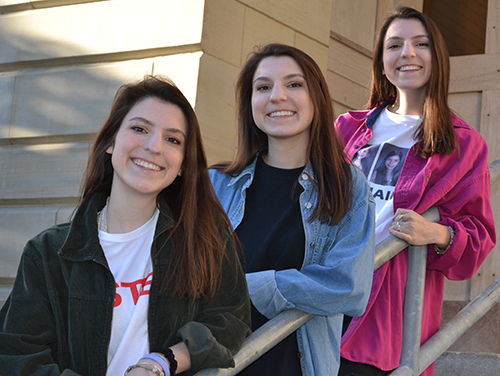
Frances, Teresa, and Mary Ponicki in front of the Engineering Building in fall 2018.
In fact, all three Ponicki sisters considered failure to be key to their growth, which, along with problem solving, seemed to be their mantra during their time at Illinois. For example, Mary Ponicki believes these two experiences have prepared her for what lies ahead.
“Illinois has just been so full of opportunities for me to challenge myself, for me to fail and for me to grow,” she acknowledges.” While she doesn’t know what she’s going to be experiencing in the future—“You just don't know what's ahead, right?”—and might be able to use the physics and math that she’s learned, but might not, she’s sure she’ll be solving problems. “But the problem solving that you're doing right now, I think, is just so invaluable, and I think that has been just so helpful in terms of my future career.”
Teresa agrees regarding how Illinois has prepared her for what lies ahead: “It’s been the curriculum itself; it's been the logic; it's been the problem solving, and it's been the failures. It's really easy to take a class that you're kind of already familiar with, and it's fun, and it's great, and you can kind of breeze through it. But it's the classes with the learning curves—and these classes, they don't just teach you about engineering, but they break it down, and it's essentially logic and problem solving. And I've used that so much for all kinds of problems.”
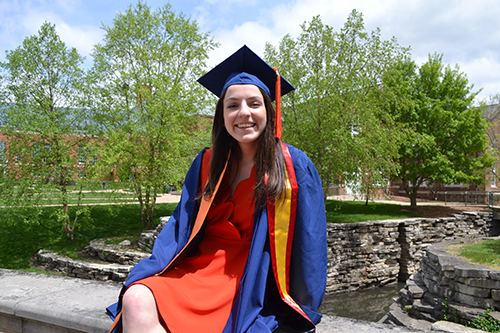
Frances Ponicki.
Like her sisters, Frances believes one of the biggest things she’s gained at Illinois is her ability to problem solve. She remembers complaining to her dad when taking her first engineering course. “‘Dad, what am I even learning about?’ He was like, ‘Fran, just focus on the fact that you're problem solving.’” He encouraged her that although she might think, ‘Oh, I'm never going to use this again!’ about some of the things she was doing, ‘in reality,’ he advised, ‘you probably will, because you're going to be applying those problem-solving skills.”
She acknowledges that when studying abroad and forced to make quick decisions that had backfired, she’d utilized those problem solving skills. She’d say, “‘Oh, I didn't expect this to happen. I can't panic here. How can I optimize this?’ because that's my degree.” She’d ask herself, “How can I handle this? What have I learned that has helped me focus, look at the different outcomes, and see how I can get from A to B?”
One milestone of their careers at Illinois was successfully completing their senior design projects. Mary found the project exciting because it was similar to what she’ll be doing in the future as an engineer, and calls finishing it “just one of the most rewarding experiences.” Her project involved designing a method a lead manufacturing company could use to separate lead from brass in used bullets collected from shooting ranges.
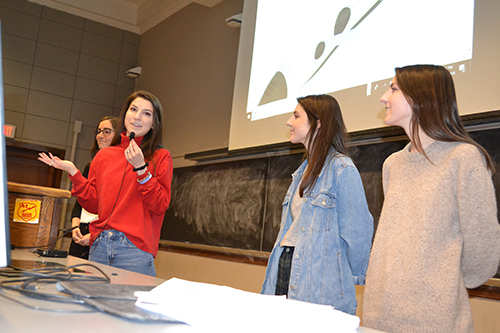
The Ponicki triplets present their redesign of the Spieltek Virtual Reality Headset during the final presentation for their fall 18 ME270 course.
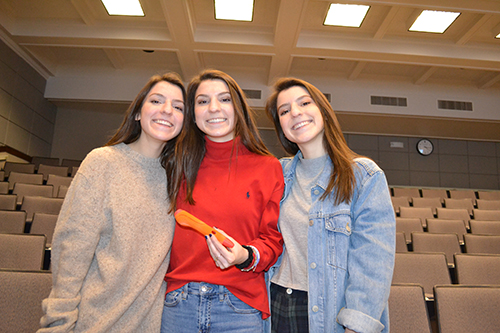
The Ponicki tripletts exhibit their redesigned 3D pen.
“To be completing it in a successful manner, and to be walking out and saying, ‘Wow, I actually did something that was productive and helpful and is going to benefit a company in its future path is a very rewarding feeling, to say the least.”
For Teresa, finishing her senior design project— designing new tongs for a local company to help minimize or eliminate shoulder injuries and carpal tunnel injuries in their workers—was one of her highlights as well. “Not only was it just so relieving; it was just so gratifying and rewarding. I mean, actual blood, sweat and tears went into that project!” Teresa particularly appreciated drawing on things she’d learned over the last four years at Illinois—not just over the past semester. Most rewarding of all was creating an actual, tangible product: “a physical object that we had produced. And it worked, and it was implemented. It was just the coolest feeling ever.”
Like her sisters, Frances says one of her new favorite memories from over the last four years was recent too and had actually happened the night before, at their last final. She shares an anecdote.
Over the last semester, Frances, her sisters, and Siobhan Fox had teamed up to build (or “co-parent,” as Frances terms it) a robot. They’d learned C++ and been developing the code to program their robot all semester. The goal was to have it navigate a course without touching any wood, plus it had to recognize different colored lights in order to stop and go. Just for fun, before moving through the course, Robbie the Robot would actually say his name, “I am Robbie!”
Frances reports that they were all kind of nervous when the night of the competition arrived. “We had put in a lot of hours, but you never know.” However, Robbie’s first trip through the course, he hit wood, which meant they didn't get any of the bonuses. Frances says they were all “super bummed,” but knew how to fix the problem, hunkered down before a computer, and made some adjustments. The second time Robbie navigated the course, he actually ended up taking first place! (Knowing the professors, they probably loved that even more than if they had been successful the first time. They had faced adversity, figured out the problem, addressed it, then been successful.) The four ended up taking third place overall among the three different courses.
“So it was just very gratifying,” Frances exults. “Freshman year, I did not know a lick of code. The beginning of senior year, I did not know much about coding at all. And to be able to place at the end of the semester, it was so rewarding. All four of us were just walking on air.”
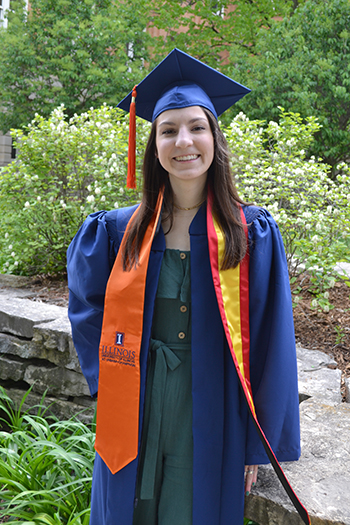
Teresa Ponicki.
The Ponicki’s also found the community at Illinois to be an important part of their experience. For example, they lived at Newman Hall all four years on campus, and considered it to be an important community for them during their stay here. According to Teresa, they’ve been ambassadors, and given tours. “We've been involved with them since day one the freshman year,” she says. “And that has just been such an incredible experience to be built into that kind of community. It's built so many friendships, offered so many opportunities… I'm big on community,” she admits, “and it's been really cool to grow in one and to make such a big campus feel smaller in the process.”
Frances agrees that Newman Hall was key in developing life-long relationships. She admits that when she first came to Illinois, she was asking herself, “Who's going to have similar values to me? How am I gonna make friends?” Living then working at Newman she reports being able to “make friends with similar values who supported me and loved me throughout my entire journey, and that was super invaluable.”
Regarding community, Frances reports that because ISE is a small department, it became like a family for them. The girls know everybody they’re graduating with. They took classes with them, did homework together, went to events together. “Having that sort of support system, to me, was more valuable than joining an actual RSO, because these are the people I see every day, and they’re with me doing my homework, and they're with me going to have fun, and we did it together.”
One organization Teresa found particularly helpful during her stint at Illinois was the I-PENG office (the international program for engineers). She and her sisters studied abroad—twice—in Spain then Australia. “They have just been so great, so supportive,” Teresa reports. They just were really crucial in supporting us and being good resources. And they really helped us explore who we are, what we want to do.”
Teresa found the study-abroad experience itself to be invaluable. “It's just a whole change of perspective, and I think it's something that everybody should do,” she says. Since their return, she and her sisters have sort of been ad hoc I-PENG ambassadors, talking to other students about their experiences and encouraging them to consider studying abroad. “Being able to talk to students and reach out to them and push them to grow too, that has been really special.”
Another key source of community at Illinois that all three praised highly was the faculty. For example, Teresa, who had been expecting to make good friends with students during college, admits that she has also really valued the relationships she’s made with her professors. “That's not what I was expecting,” she admits, “getting to know a lot of our professors. I mean, they've mentored all three of us, given us advice, helped us to grow. They've encouraged our learning, and they're great resources for the future as well. And I know they're always going to be here; we're going to be in touch, that's been a really valuable resource as well.”
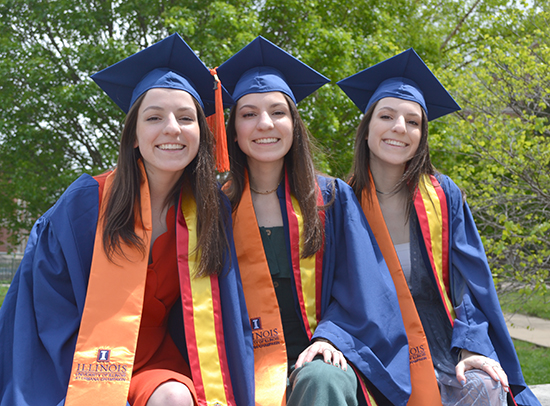
Frances, Teresa, and Mary Ponicki on the Engineering Building Portico in front of Bardeen Quad.
In fact, Frances raves about Dan Block, whom she calls “the greatest human being.” In charge of mechatronics, he was key in helping them build their robot. Frances recalls when the four of them first met him at the beginning of the semester, he said, “You guys are gonna be spending a lot of hours in lab, and you're going to be learning C code.’ And I was like, ‘I have never coded like this before in my life!’ I was really stressed out. But Dan, he was with us every step of the way!” She says he would not only be in the lab 9:00 AM to 6:00 PM every day, but he even came in on weekends to help them. “He would sit with you until you figured out what your bug in the code was. Professors like that who sit down, and get to know you, and cheer you on,” she says, alluding to Block and other professors, “I wouldn't be here without them.”
Mary echoes the importance of the Illinois faculty. “We always say Illinois has been one big opportunity for us, but all those opportunities stem from the faculty here and specifically in our department, and the Study-Abroad Office.” She then goes on to cite key Illinois folk who meant a lot to them: Professor Leon Liebenberg, Dan Block, Heidi Craddock, Professor Carolyn Beck, and Professor Richard Sowers.
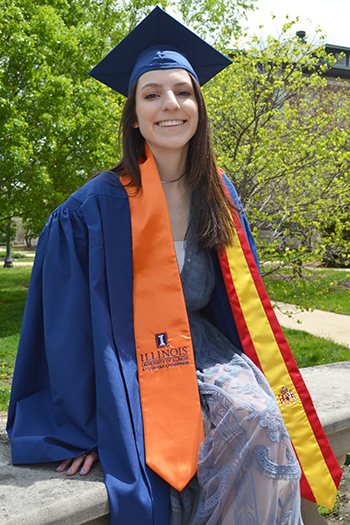
Mary Ponicki.
They’ve even told their friends, “There just hasn't been a professor that we haven't loved or haven't been able to connect with,” Mary says. “And all these people have provided us with the opportunities that we just love so much. And that's why we love Illinois, because Illinois is one big opportunity, but those opportunities stem from our relationship with the faculty here.”
Regarding the triplets’ immediate future, they’re all going to be working at AT&T’s headquarters in Dallas as part of their talent development program, specifically coordinating with their design thinking team.
“So, we're excited about that,” Mary admits. “It's a big move, but it’ll be fun to do it together.”
How did they ever pull it off, all three of them in one place? ISE received an email saying that AT&T was specifically looking to hire people in their department, so all three applied and interviewed around the same time. Mary reports that AT&T was really intrigued by the idea of hiring all three. “We all interviewed separately, and they liked our energy. They were happy with our accomplishments, and they were like, ‘You three all seem like a good fit. Why wouldn't we take all three of you?’”
Story and photos by Elizabeth Innes, Communications Specialist, I-STEM Education Initiative, unless noted otherwise.
For more related stories, see:
- Becoming Engineers at Illinois Triple the Fun for the Ponicki Sisters
- Freshman Women in Engineering Get Ahead of the Curve At WIE Orientation
- Liebenberg’s ME 270 End-of-Semester Main Project Presentations Showcase Students’ Manufacturability Redesigns
More: Illinois Legacies, Student Spotlight, WIE, Women in STEM, 2019
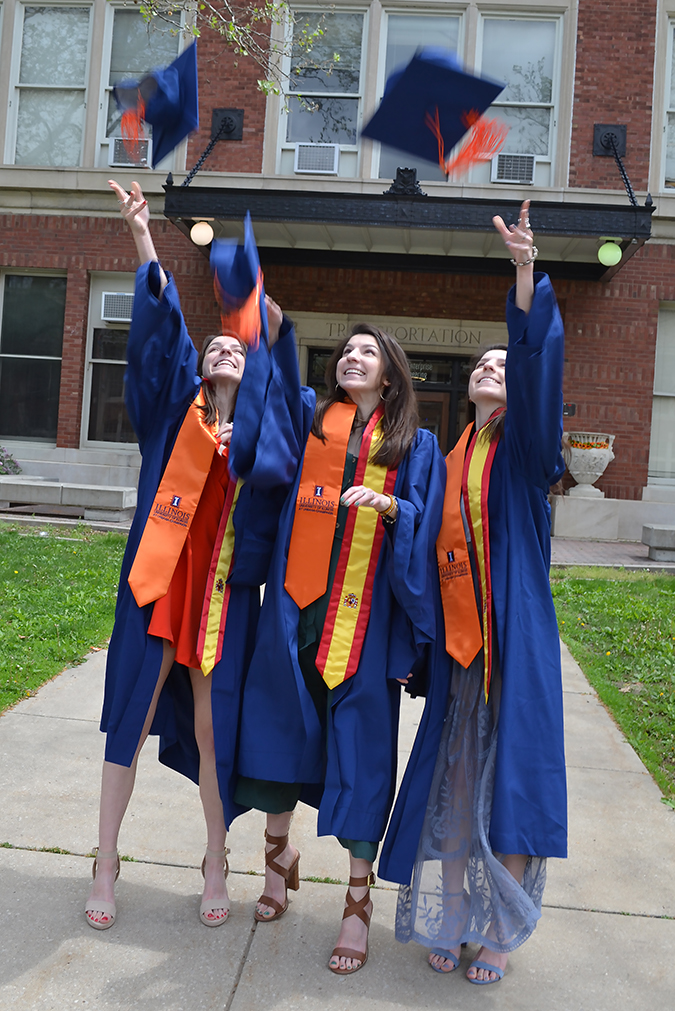
Left to right: Frances, Theresa, and Mary Ponicki toss their caps in front of the Transportation Building, home of ISE.













.jpg)
















